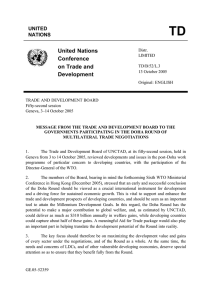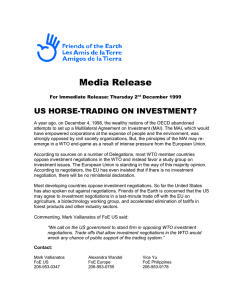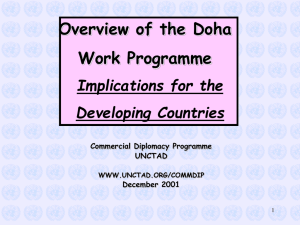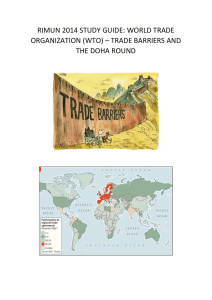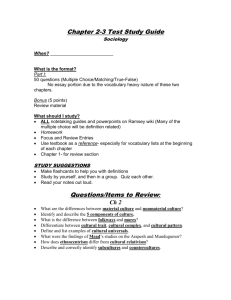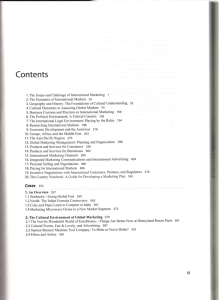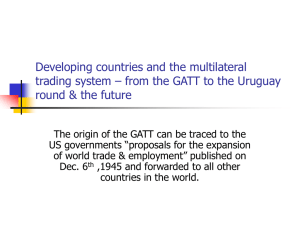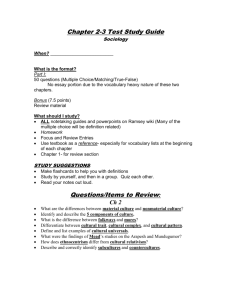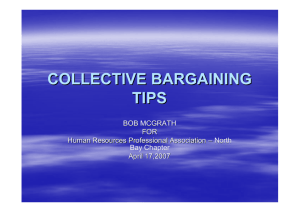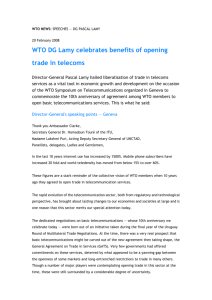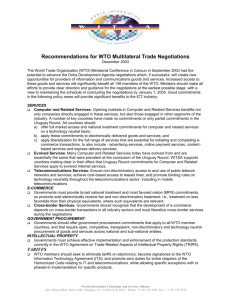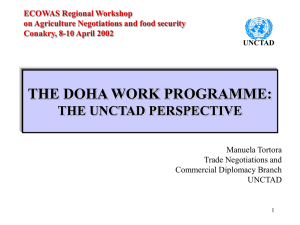The Globalization of International Relations
advertisement
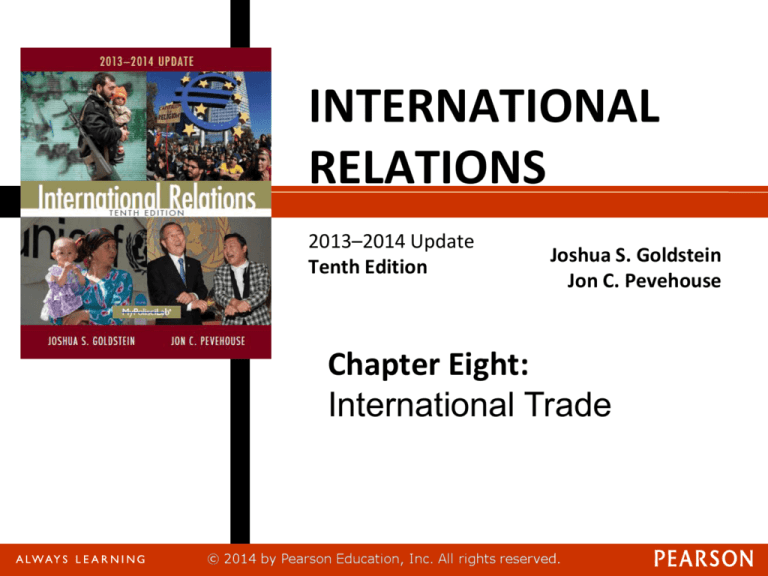
INTERNATIONAL RELATIONS 2013–2014 Update Tenth Edition Joshua S. Goldstein Jon C. Pevehouse Chapter Eight: International Trade Port in Valparaiso, Chile, 2005. 8.1 Theories of Trade Liberalism and Mercantilism Comparative Advantage Political Interference in Markets Protectionism MyLab Media Simulations: International Trade: You Are a Trade Expert http://media.pearsoncmg.com/long/long_mpsk_media_1/si ms_2011/trade_expert/player.html Please log into MyPoliSciLab with your username and password before accessing this link. Liberalism and Mercantilism Mercantilism Economic liberalism Comparative Advantage Trade creates wealth by allowing states to specialize in producing goods and services for which they have a comparative advantage (and importing other needed goods) Drawbacks of trade from political (rather than economic) vantage point Political Interference in Markets Market imperfections Monopoly Oligopoly Corruption Legal framework for markets Taxation Sanctions Autarky Protectionism Motivations Methods 8.1 Theories of Trade Q: The mercantilist approach to trade is similar to what theoretical framework? A) Liberalism B) Realism C) Structuralism D) Feminism Answer: B) Realism True/False: Emphasizing worldwide free trade, liberal economics advocates for international cooperation. Answer: True 8.2 Trade Regimes World Trade Organizations (WTO) - formerly GATT Bilateral and regional agreements Cartels Industrial and interest groups Enforcement of trade rules MyLab Media Video: IMF Conditionality and the Irish Bailout. http://media.pearsoncmg.com/long/long_mpsk_media_1/vid eo_2011/ireland/player.html Please log into MyPoliSciLab with your username and password before accessing this link. The World Trade Organization (WTO) Most-favored-nation principle Generalized system of preferences Rounds of negotiations SANCTIONS BITE Economic sanctions, such as the current international restrictions on trade and business with Iran, are among the most obvious ways that politics interferes in markets. Sanctions are hard to enforce, especially when not all countries participate, because doing business is profitable. Once Europe and the United States coordinated tough sanctions on Iran, they caused major economic disruption there, triggering a decline in Iran’s currency by about half. Here a street vendor offers banknotes on a Tehran street, 2013. KING COTTON Protectionism uses various means to keep foreign imports from competing with domestic products. Agricultural producers in the global South complain that subsidies and other protectionist measures in Europe and the United States prevent poor farmers in developing countries from exporting to world markets. Here, cotton awaits processing in Mali, where low prices for cotton, the country’s most important cash crop, have hurt farmers badly. (2006) MAKING MAGIC Rounds of trade negotiations, such as the current Doha Round begun in 2001, last for years as members negotiate complex deals that must be approved by consensus of all 150 member states. A conference of trade ministers in December 2005 tried to regain momentum for the stalled Doha Round, with mixed success. Here, WTO head Pascal Lamy opens the conference with the tool he hopes will bring success—a magic wand. The talks remained stalled in early 2013. Bilateral and Regional Agreements Bilateral agreements Free trade areas Cartels Organizations of Petroleum Exporting Countries (OPEC) International Energy Agency (IEA) Joint producer-consumer cartels President of Brazil, Dilma Rousseff Industries and Interest Groups Influence state’s foreign economic policies Industrial policy Industries important in trade negotiations currently COMPETING WITH BIG CORN Agriculture is at the top of the agenda of international trade negotiations, as developing countries push richer ones to end farm subsidies. Here, Mexican farmers protest the full opening of Mexico’s markets to imported U.S. corn under NAFTA, 2008. J’ACCUSE! Intellectual property rights have been an important focus of recent trade negotiations. In many countries, pirated copies of videos, music, and software sell on the street with no royalty payments. Here, the U.S. Trade Representative holds a pirated DVD from China as she filed a copyright complaint against China in the World Trade Organization, 2007. Enforcement of Trade Rules Reciprocity Retaliation 8.2 Trade Regimes Q: Which of the following topics is on the agenda of the Doha Round of WTO trade negotiations? A) Forestry B) Industrial products C) Electronics D) Maritime treaties Answer: B) Industrial products True/False: In Europe, North America, and in several other less important instances regional free trade areas have been created. Answer: True 8.3 Economic Globalization The evolving world economy Resistance to trade The Evolving World Economy Industrial Revolution Free trade Great Depression, Keynesian economics After World War II Centrally planned economics Transitional economics China State-owned industries Resistance to Trade Workers Human rights NGOs Environmental groups CHEAP LABOR Labor, environmental, and human rights organizations have all criticized unrestricted free trade. They argue that free trade agreements encourage MNCs to produce goods under unfair and unhealthy conditions, including the use of child labor. This boy in India makes soccer balls, 2002. UNSETTLING CHANGES Growing trade makes states more interdependent. This may make them more peaceful, but can also introduce new insecurities and sources of conflict. The worldwide economic turmoil starting in 2008 sharpened some trade conflicts, while WTO negotiations remained stalled. This ship that ran aground off New Zealand in 2011 seemed to embody the precarious state of trade relations. 8.3 Economic Globalization Q: Which of the following is characteristic of centrally planned economies? A) Government officials set prices B) Religious authorities decide on production quotas C) They were dominant in Africa during the Cold War D) Governments cannot guarantee the basic needs of citizens Answer: A) Government officials set prices True/False: The world economy is drastically integrated on a global scale, generating wealth at a decelerating pace. Answer: False Chapter Discussion Question What role do sanctions play in international markets? Be specific. Why are they used, as opposed to other means of influence? And how effective are they, in general? Use specific examples to aid your discussion.
